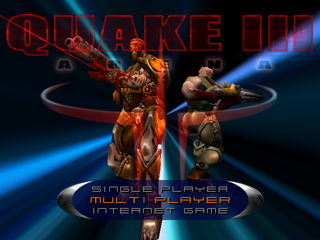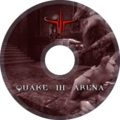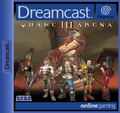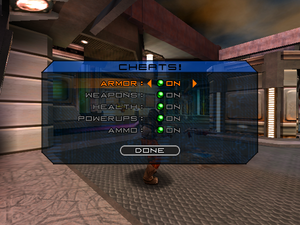Quake III Arena
From Sega Retro
| Quake III Arena | |||||||||||||||||||||||||||||||||||||||||||||
|---|---|---|---|---|---|---|---|---|---|---|---|---|---|---|---|---|---|---|---|---|---|---|---|---|---|---|---|---|---|---|---|---|---|---|---|---|---|---|---|---|---|---|---|---|---|
| System(s): Sega Dreamcast | |||||||||||||||||||||||||||||||||||||||||||||
| Publisher: Sega | |||||||||||||||||||||||||||||||||||||||||||||
| Developer: Raster Productions, No Cliché (EU) | |||||||||||||||||||||||||||||||||||||||||||||
| Supporting companies: Sega.com | |||||||||||||||||||||||||||||||||||||||||||||
| Distributor: Tec Toy (BR) | |||||||||||||||||||||||||||||||||||||||||||||
| Licensor: id Software, Activision | |||||||||||||||||||||||||||||||||||||||||||||
| Original system(s): PC | |||||||||||||||||||||||||||||||||||||||||||||
| Developer(s) of original games: id Software | |||||||||||||||||||||||||||||||||||||||||||||
| Peripherals supported: Visual Memory Unit, Jump Pack, Dreamcast Keyboard, Dreamcast Mouse, Panther DC, Broadband Adapter, Dreamcast Modem, Dreamcast VGA Box | |||||||||||||||||||||||||||||||||||||||||||||
| Genre: Action | |||||||||||||||||||||||||||||||||||||||||||||
| Number of players: 1-4 | |||||||||||||||||||||||||||||||||||||||||||||
| Official in-game languages: | |||||||||||||||||||||||||||||||||||||||||||||
| |||||||||||||||||||||||||||||||||||||||||||||
|
Quake III Arena is a first person shooter and a direct sequel to Quake II. It was developed by id Software and ported to a variety of systems, including the Sega Dreamcast (whose port was handled by Raster Productions). The last game in this franchise to appear on a Sega system was Quake on the Sega Saturn.
Quake III differs from previous installments in the series in that the game is focused on multiplayer matches. The technology and simplicity of Quake III made the game extremely popular, so much so that many people still play the game online today, despite the game being over a decade old. It is one of the few Dreamcast games which can still be played online due to fan servers.
Contents
Gameplay
Control Options
The Dreamcast port of Quake III Arena is compatible with a number control options including the standard controller, the MadCatz Panther DC as well as the Dreamcast Keyboard and Dreamcast Mouse. In split-screen multiplayer individual players can be mapped up to two devices, as the keyboard and mouse require a control port each. Players can use the following setups:
- One device for up to four individual players (Controller, Keyboard, Mouse or Panther DC)
- Two devices for up to two individual players (Controller + Keyboard, Keyboard + Mouse, Controller + Mouse)
During online matches, keyboard accessories can be used for text chatting to other players, or team members during team games.
There are five different control setups when configuring controls for your preferred device(s).
- Preset 1 (1) - Dreamcast Controller
- Preset 2 (2) - Keyboard & Mouse
- Preset 3 (3) - Alternate Dreamcast Controller
- Preset 4 (4) - MadCatz Panther DC
- Custom (C) - Allows you to map to any button or axis.
Single Player
Unlike previous entries of the Quake franchise, Quake III Arena was built to be primarily a multiplayer shooter. However there is an Arena Gauntlet mode that allows you to fight computer player opponents through five tiers. This was designed to ease players into playing against real opponents through a gradual learning curve to ease players into the faster paced gameplay.
Multi Player & Internet Game
The Multi Player option allows up to four human players or up to three computer opponents play in an arena. Depending on how many local players are playing determine which maps will be available.
Internet Game allows online play for up to four players, one player per system across all the maps and game modes available. Internet Game allows to chat between different players or team mates if the Dreamcast Keyboard is being used.
Because Quake III allows peer-to-peer connection, the US version can still be played online. Dreamcast users will need to connect to servers via an IP address with a working Broadband Adapter.
Game Modes
- Deathmatch - The player with the most frags wins.
- Team Deathmatch - Two teams compete to earn the most frags
- Tournament - Two combatants compete for the most frags and take turns between other players who are in the same game
- Capture the Flag - Two teams compete to capture the other team's flag and bring it back to their own flag.
Items
Different items will appear in each arena that will help or hinder players.
Weapons
Players start off with the Gauntlet and the Machine Gun at the start of a match or when respawning. Different weapons and ammunition pick ups are spread out in each arena. The Gauntlet is the only weapon that does not require ammo, however can only cause damage and can be used in close range.
- Gauntlet
- Machine Gun
- Shotgun
- Plasma Gun
- Grenade Launcher
- Rocket Launcher
- Lightning Gun
- Rail Gun
- BFG-10K
Armor
Armor will help protect players by decreasing the amount of damage caused by other factors. Armor points can go up to 200, however will count down if it's over 100 points. Armor pick ups will stack over each other.
- Armor Shard - 5 points
- Combat Armor - 50 points
- Heavy Armor - 100 points
Health
Health pickups allow you to regain lost health during combat. Each spawn grants players 125 health, however health ratings that are over 100 will gradually count down.
- Green- 5 points
- Yellow - 25 points
- Gold - 50 points
Green health bonuses will allow you to go past 200 health points while Yellow and Gold will bring you up to 100 points.
Power-Ups
- Battle Suit
- Flight
- Haste
- Invisibility
- MegaHealth
- Quad Damage
- Regeneration
- Medkit
- Teleporter
Gimmicks and Hazards
- Acceleration Pads
- Bounce Pads
- Doors
- Fog of Death
- Fog
- Gates
- Lava
- Teleporters
- Triggers
- Voids
- Red and Blue Flags
Medals
During gameplay in both Single and Multiplayer modes come opportunities to be awarded with medals based on performance.
- Excellent - Award for making two frags within two seconds
- Impressive - Award for making two consecutive shots with the Rail Gun.
- Frags - Awarded for every 100 frags.
- Accuracy - Awarded when accuracy is over 50% at the end of a round.
- Gauntlet - Award for each frag obtained with the Gauntlet
- Perfect - Award for surviving a round without being fragged.
Map List
Quake III on the Dreamcast features down-sized and re-balanced levels from the original version, adjusted to take into account the maximum player count of four players offline and online. A number of levels have also been omitted in this version, and some levels are not available in certain split-screen modes due to RAM limitations of the Dreamcast hardware. Four players can play online at the same time on all the levels in the game. The allowed amount of players for each level in split-screen is listed below, along with the exclusive levels made just for the Dreamcast version.
| Map | Max Players Split-screen |
|---|---|
| Arena Gate | 1 |
| House of Pain | 2 |
| Powerstation 0218 | 2 |
| Arena of Death | 2 |
| Blue Monday | 2 |
| Hidden Fortress | 1 |
| Dark Chapel | 1 |
| Place of Many Deaths | 2 |
| The Forgotten Place | 1 |
| The Camping Grounds | 1 |
| Fatal Instinct | 1 |
| Temple of Retribution | 1 |
| Lost World | 1 |
| Gaze of the Abyss | 1 |
| The Proving Grounds | 1 |
| Evil Playground | 1 |
| The Bouncy Map | 1 |
| The Longest Yard | 1 |
| Hell's Gate | 1 |
| Map | Max Players Split-screen |
|---|---|
| Revolver | 4 |
| Frenzy | 4 |
| Incinerator | 4 |
| Brute Force | 4 |
| Agony | 4 |
| Crisis | 4 |
- Can also be played in Tournament and Team Deathmatch modes.
| Map | Max Players Split-screen |
|---|---|
| Dueling Keeps | 1 |
| Space CTF | 1 |
| Blast Radius | 1 |
| Fallout Bunker | 1 |
| Map | Max Players Split-screen |
|---|---|
| Incinerator | 4 |
| Slow Burn | 4 |
| Revolver | 4 |
Production credits
- Programming: John Carmack, Robert A. Duffy, Jim Dosé
- Art: Adrian Carmack, Kevin Cloud, Kenneth Scott, Seneca Menard
- Game Designer: Graeme Devine
- Level Design: Tim Willits, Christian Antkow, Paul Jaquays
- CEO: Todd Hollenshead
- Director of Business Development: Marty Stratton
- Office Manager and id Mom: Donna Jackson
- Development Assistant: Eric Webb
- Bot AI by: Jan Paul van Waveren
- Original Dreamcast Music by: "Razor"
- Programming: Aaron Seeler
- Art: Won Choi
- Level Design: Kaai Cluney
- Additional Design: William Joseph
- Senior Producer: Scott "Swirl" Hawkins
- Product Manager: Rob "Rudnik" Alvarez
- Associate Product Manager: Cord "Noname" Smith
- Product Coordinator: Frank "Elusive" Viloria
- Lead Tester: Chris "Welderboy" Meyer
- Assistant Lead Testers: Keehwan "KEES" Her and Jordan "Elvis" Romaidis
- Testsers: Michael Jao, Davidson Talag, Cory Sturtevand, Stephen Campbell, Jason Jensen, Mark Gonzalez, Adam Terminello, Henry Perez, Aaron Poser, Daniel Chang, Paul Jarolimek-Proner, Jumbo Duclayan, Tom Fong, Christina Mendez, Joseph Amper, Stefan Conde, Ron Rodriguez, Steven Jee and Nestor Protacio
- Sega of America Developer Technical Services: Dylan "Ap0stle" Bromley, John "MegaWuss" Byrd, Judy "Lady J" Jette, Gary "Freak" Lake, Carlton "Majinbuu" Matthews, Neal "Bungdabba" Robinson, David "Bambi" Rudolph, "Corned Mike" Tucker, Joe "The Vulture" Votour
- Special Thanks: Peter Moore, Shinobu Toyoda, Chris Gilbert, Bob Dales, Ali Daimee, Naohiko Hoshino, Serge Plagnol, Jose Aller, Jin Shimazaki, Hisaki Nimiya, Kenichi Iwanaga, Masaharu Yoshii, John Goodale, Greg Thomas, Scott Patterson, Leonard Slootmaker, John Golden, Charlie Bellfield, Kathleen Joyce, Bob Schonfisch, Angela Santos, Alex Villigran, Tina Mendez, Heather Hawkins, Karen Brown, Teri Higgins, Gwen Marker, Tom Dudley, Ken Davis, Lu Luna, Toshi Morita, Douglas Broadhurst, Wilco Ibes, Sean Doidge, Arnold Feener, John Amirkhan, Todd Slepian, Polly Escalona, and Mark Fuentes
- Network Producer: Jeff "hal9000" Hedges
- Server/Network Engineering: Stephen "Azayel" Willers, Eugene Archibald, Britt Morris, Sergey Gitman and Jeff "hal9000" Hedges
- Lead Internet Software Analyst: Darren "Smackaveli" Nagtalon
- Assistant Lead Internet Software Analysts: Josh "MacrossJXS" Simpson and Paco "Trunks" Youngel
- Internet Software Analysts: Nicolas Azizian, Samir Gupta, Lance Nelson, Malak Rida, Ryan Sindledecker, Cliff Wilhelm and Eric Wilhelm
- Special Thanks: Jerry Markota, Joey Berrios, Art Datangel, Jason Nolen, Olga Kaminskaya, Dow Truax, Doug Shrock, Takashi Kosaka, Brad Watters, Lynn MacConnell, Brad Huang, Keitaro Shigemasa, Bee Low, Aiyu Li, Julia Miller, Skip McIlvaine, and Mike Browning
- Executive Producer: Jonathan Knight
- Associate Producer: Steve Rosenthal
- Director Global Brand Management: Dusty Welch
- Brand Manager: Kevin Kraff
- Production Testers: Joe Favazza, Patrick Bowman, Eddie Flores, Mike Stephan, Hans Waklins
- Special Thanks: Bobby Kotrick, Brian Kelly, Ron Doornick, Mitch Lasky, Michael Pole, George Rose
Magazine articles
- Main article: Quake III Arena/Magazine articles.
Promotional material
Artwork
Physical scans
| Sega Retro Average | |||||||||||||||||||||||||||||||||||||||||||||||||||||||||||||||||||||||||||||||||||||||||||||||||||||||||||||||||||||||||||||||||
|---|---|---|---|---|---|---|---|---|---|---|---|---|---|---|---|---|---|---|---|---|---|---|---|---|---|---|---|---|---|---|---|---|---|---|---|---|---|---|---|---|---|---|---|---|---|---|---|---|---|---|---|---|---|---|---|---|---|---|---|---|---|---|---|---|---|---|---|---|---|---|---|---|---|---|---|---|---|---|---|---|---|---|---|---|---|---|---|---|---|---|---|---|---|---|---|---|---|---|---|---|---|---|---|---|---|---|---|---|---|---|---|---|---|---|---|---|---|---|---|---|---|---|---|---|---|---|---|---|---|
|
| 88 | |
|---|---|
| Based on 25 reviews | |
| Dreamcast, US |
|---|
| Dreamcast, EU |
|---|
Technical information
- Main article: Quake III Arena/Technical information.
The Dreamcast port of Quake III Arena is capped at 30 FPS. It runs on a Dreamcast port of the id Tech 3 engine used for the original PC version of Quake III Arena.[41] Raster Productions made several optimizations to the engine for the Dreamcast hardware, allowing it to run at a smooth frame rate.
Quake III Arena was the most intensive PC game released in 1999, rendering 10,000[42] to 15,000 triangles per scene (at up to 48 FPS on an nVidia TNT2 AGP).[43] On the Dreamcast, the frame rate is capped at 30 FPS, and it renders up to 500,000 triangles per second (about 16,000 triangles per scene).[44] This was a small fraction of what the Dreamcast was capable of rendering, compared to other Dreamcast games which rendered several million triangles per second while maintaining 60 FPS, such as Dead or Alive 2 (up to 51,894 triangles per background and 9246 triangles per character). Quake III Arena was thus not fully optimized for the Dreamcast.
Nevertheless, Quake III Arena was more optimized for the Dreamcast than Unreal Tournament was, with the Dreamcast version of Quake III Arena having more polygon geometry, stable frame rate and dynamic colored lighting.[45]
VMU features
Quake III Arena can utilize VMU storage to save progress. It can carry five profiles and five save games for the Single Player mode.
| Name | File Name | Comment | File Size | Icon |
|---|---|---|---|---|
| Quake III Arena | QUAKE3_ARENA | Quake III Arena | 25 blocks |
During gameplay, the player's avatar will show on the LCD screen.
There is also a mini game in which the player must guide a dot through a maze which can be played after completing the Single Player campaign on any difficulty. Each difficulty level has its own unique maze, and solving each one will award the player with a different cheat for use during offline Single and Multiplayer game modes. The cheat menu is accessed by pausing during an offline Single or Multiplayer game, entering the 'Setup' sub-menu, then scrolling down past 'Internet' to the 'Cheats!' option.
ROM dump status
| System | Hash | Size | Build Date | Source | Comments | |||||||||
|---|---|---|---|---|---|---|---|---|---|---|---|---|---|---|
| ? |
|
GD-ROM (US) | ||||||||||||
| ? |
|
GD-ROM (EU) | ||||||||||||
| ? |
|
2000-09-05 | GD-R | Page | ||||||||||
| ? |
|
2000-10-26 | GD-R | Page |
External links
- Sega of America webpage: Dreamcast
References
- ↑ 1.0 1.1 Press release: 2000-10-19: Sega Unleashes Quake III Arena On Dreamcast for Its Console Debut
- ↑ http://www.ebworld.com:80/ebx/default.asp (Wayback Machine: 2000-10-19 09:01)
- ↑ http://www.chipsworld.co.uk/detProd.asp?ProductCode=3128 (Wayback Machine: 2002-07-15 16:16)
- ↑ http://amazon.co.uk/exec/obidos/tg/stores/feature/feature/-/videogames/50781 (Wayback Machine: 2001-02-11 06:17)
- ↑ DC-UK, "December 2000" (UK; 2000-10-23), page 6
- ↑ 6.0 6.1 6.2 Dreamcast Magazine, "No. 16" (UK; 2000-11-30), page 40
- ↑ 7.0 7.1 Computer & Video Games, "December 2000" (UK; 2000-11-15), page 86
- ↑ http://www.micromania.fr/zooms/?ref=1002 (Wayback Machine: 2002-10-27 12:29)
- ↑ http://www.amazon.fr:80/exec/obidos/tg/browse/-/557794/ref=vg_br_dp_3_lf/t/ (Wayback Machine: 2001-07-15 03:09)
- ↑ http://www.centromail.es/top/ficha.asp?codmail=15769&codprov= (Wayback Machine: 2001-09-17 16:01)
- ↑ http://www.gameswarehouse.com.au/DRCnew.asp (Wayback Machine: 2002-01-01 22:11)
- ↑ File:QuakeIIIArena DC US Manual.pdf, page 31
- ↑ Neo Plus, "Kwiecień 2001" (PL; 2001-xx-xx), page 100
- ↑ Neo Plus, "Maj 2001" (PL; 2001-xx-xx), page 100
- ↑ Neo Plus, "Czerwiec 2001" (PL; 2001-xx-xx), page 100
- ↑ Neo Plus, "Lipiec-Sierpień 2001" (PL; 2001-xx-xx), page 84
- ↑ Neo Plus, "Wrzesień 2001" (PL; 2001-xx-xx), page 84
- ↑ 576 Konzol, "December 2000" (HU; 2000-xx-xx), page 39
- ↑ Ação Games, "Janeiro 2001" (BR; 200x-xx-xx), page 40
- ↑ Bonus, "8/2000" (YU; 2000-10-25), page 52
- ↑ Consoles +, "Décembre 2000" (FR; 2000-1x-xx), page 114
- ↑ Dreamcast Monthly, "Christmas 2000" (UK; 2000-11-23), page 66
- ↑ DC-UK, "Christmas 2000" (UK; 2000-11-17), page 52
- ↑ Digitiser (UK) (2001-01-02)
- ↑ Edge, "Christmas 2000" (UK; 2000-11-29), page 105
- ↑ Electronic Gaming Monthly, "January 2001" (US; 2000-12-05), page 194
- ↑ Entsiklopediya igr dlya Dreamcast, "Izdaniye chetvertoye, dopolnennoye" (RU; 2002-xx-xx), page 163
- ↑ GamePro, "January 2001" (US; 200x-xx-xx), page 104
- ↑ Game Informer, "January 2001" (US; 200x-xx-xx), page 113
- ↑ Gamers' Republic, "December 2000" (US; 2000-xx-xx), page 93
- ↑ Hyper, "March 2001" (AU; 2001-01-24), page 73
- ↑ Neo Plus, "Grudzień 2000" (PL; 2000-xx-xx), page 58
- ↑ Neo Plus, "Kwiecień 2001" (PL; 2001-xx-xx), page 40
- ↑ Next Generation, "January 2001" (US; 2000-12-21), page 80
- ↑ Official Dreamcast Magazine, "January 2001" (UK; 2000-11-30), page 56
- ↑ Official Dreamcast Magazine, "Holiday 2000" (US; 2000-11-28), page 98
- ↑ Playbox, "Décembre 2000" (FR; 2000-1x-xx), page 22
- ↑ Play, "Marzec 2001" (PL; 2001-xx-xx), page 14
- ↑ PSX Extreme, "03/2001" (PL; 2001-0x-xx), page 40
- ↑ Power Unlimited, "Jaargang 9, Nummer 1, Januari 2001" (NL; 200x-xx-xx), page 57
- ↑ htt (Wayback Machine: 2005-12-23 05:28)
- ↑ [PC Magazine, December 1999, page 203 PC Magazine, December 1999, page 203]
- ↑ Maximum PC, June 2000
- ↑ NullDC
- ↑ Quake III Arena vs Unreal Tournament (IGN)
| Quake III Arena | |
|---|---|
|
Main page | Comparisons | Hidden content | Development | Magazine articles | Video coverage | Reception | Bootlegs | |
- Broadband Adapter-compatible games
- Dreamcast Keyboard-compatible games
- Jump Pack-compatible games
- Dreamcast Modem-compatible games
- Dreamcast Mouse-compatible games
- Dreamcast VGA Box-compatible games
- Visual Memory Unit-compatible games
- Panther DC-compatible games
- 1-4 player games
- US Dreamcast games
- All US games
- EU Dreamcast games
- All EU games
- DE Dreamcast games
- All DE games
- ES Dreamcast games
- All ES games
- FR Dreamcast games
- All FR games
- UK Dreamcast games
- All UK games
- AU Dreamcast games
- All AU games
- BR Dreamcast games
- All BR games
- Dreamcast games
- 2000 Dreamcast games
- All 2000 games
- Dreamcast action games
- All action games
- Dreamcast games with Sofdec video
- All games
- Bad external reference
- Use DCSaveTable template
- Missing ROM hashes
- Games with known prototypes
- Old technical information
- Quake III Arena



























